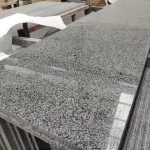Durability and ease of upkeep are two of the most important factors to take into account when choosing worktops for spaces like kitchens and bathrooms. As a result of its enduring beauty and long-lasting resilience, grey granite has become an increasingly popular option. However, in order to make an educated choice, it is necessary to evaluate grey granite in comparison to other materials that may be used for countertops. This article is to provide a complete and professional view on the durability and maintenance features of grey granite in comparison to other countertop materials. It will also take into consideration developments in the industry and offer helpful insights from a variety of perspectives.
Gray Granite’s Capacity to Last Years
Due to the fact that grey granite is famous for its outstanding durability, it is frequently selected as the material of choice for bathroom countertops. Because of the natural stone creation process, it is able to survive hard use, impacts, heat, and scratches. This gives it the strength and tenacity to withstand everything. As a result of its exceptional resistance to chipping and cracking, it is an excellent choice for high-traffic areas like kitchens. The longevity of grey granite guarantees that it can keep its beauty and functioning for a significant amount of time if it is provided with the appropriate maintenance.
Comparison with Quartz Countertops to Consider
Countertops made of quartz are designed stone surfaces that are made up of natural quartz crystals, resins, and colors. Quartz countertops and gray granite countertops are comparable in terms of their durable qualities. When it comes to heat, stains, and scratches, both of these materials are durable. In contrast to grey granite worktops, quartz countertops have a little higher resistance to chemicals and require less sealing care than grey granite countertops. Quartz, on the other hand, doesn’t come close to matching the natural beauty that gray granite possesses.
Examination in Relation to Marble Countertops
Marble countertops are renowned for their level of sophistication and luxury; nevertheless, in comparison to grey granite, they are often less long-lasting. Marble is a more delicate stone that is more prone to being scratched, etched, and stained than other types of stone. It is also more susceptible to damage caused by heat. Grey granite, on the other hand, is extremely resistant to these problems because to its great density and high level of hardness. Grey granite is more durable and requires less maintenance than marble, which requires frequent sealing and more delicate care. Marble, on the other hand, takes more care and attention.
Taking Care of Grey Granite Maintenance
Maintaining grey granite countertops in the correct manner is vital in order to retain their beauty and ensure their lifespan. Cleaning with a gentle soap and water on a regular basis is adequate for day-to-day maintenance that is required. It is essential, however, to steer clear of strong or acidic cleansers, since they might cause the surface of the stone to get damaged. Countertops made of grey granite should be sealed on a regular basis to prevent stains and the absorption of moisture. There is a correlation between the specific type of grey granite and the amount of usage, which determines the frequency of sealing.
Considerations in Relation to Solid Surface Countertops
Solid surface worktops, such as those made of Corian or materials based on acrylic, provide customers with a large variety of color options and a high degree of adaptability. Although solid surface counters are non-porous and resistant to stains, they are often less durable than grey granite. Grey granite is a more durable material. It is simple to scratch materials with a solid surface, and heat may also cause damage to these materials. In addition, in comparison to gray granite countertops, they would need to be maintained and repaired more frequently throughout installation.
Comparative Analysis with Countertops Made of Stainless Steel
The longevity of stainless steel worktops, as well as their resistance to heat and stains, make them a popular option for use in commercial kitchens. On the other hand, they are prone to scratching and easy to display fingerprints and smudges on thanks to their surface. Granite countertops in grey are an option that is more aesthetically pleasant and flexible for domestic kitchens. This is because they mix the durability of granite with the natural beauty of granite.
Concerns Regarding the Cost
When choosing between grey granite and other materials for countertops, the cost is an important consideration to take into account when evaluating the durability and maintenance of grey granite. Given that grey granite is typically more cost-effective than quartz and marble, it is an appealing choice for homeowners who are looking for a material that strikes a balance between durability, aesthetics, and financial constraints. The long-term durability of grey granite and its timeless attractiveness make it an investment that is well worth making, despite the fact that solid surface counters and stainless steel may initially be more cost-effective solutions.
In comparison to a variety of other possible countertop materials, grey granite worktops are characterized by their remarkable durability and low care needs. It is impossible to reproduce the natural beauty and one-of-a-kind appearance of grey granite countertops, despite the fact that quartz countertops offer comparable durability and require less sealing. Marble countertops, on the other hand, are susceptible to wear and tear and require more careful maintenance. The timeless attractiveness of grey granite may be lacking in solid surface and stainless steel counters, despite the fact that these materials have their own merits. Homeowners are able to make an educated decision on the selection of grey granite or other materials for their countertops by taking into consideration a variety of attributes, including the durability, upkeep, pricing, and aesthetic preferences of the homeowner.










